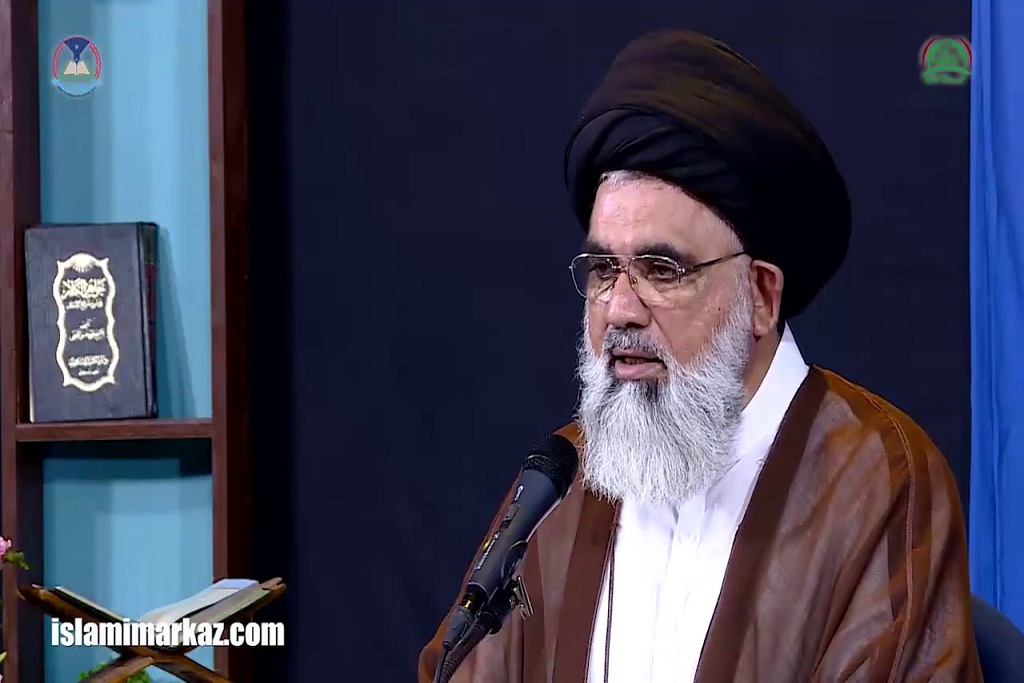Hujjatul Islam Ustad Syed Jawad Naqvi
(Principal Jamia Orwatul Wuthqa – Lahore)
Delivered at: Masjid Baitul ul Ateeq
Lahore – Pakistan
Friday Sermon – 28th Feb 2025
Sermon 1 : Dua 44 for Ramadan by Imam Sajjad (a) – Part 1
Sermon 2: Attraction and Repulsion in the character of Imam Ali (a)
Allah has established the System of Guidance through religion, and for the protection of religion, Allah has arranged Taqwa. Both religion and Taqwa are essential and ordained by Allah, which man must implement in their lives by choice. Guidance and protection must be acquired and implemented by man himself. If man does not act upon these systems, the loss is only for him, and similarly, the benefits of applying these are also for him alone.
Allah has provided several means and opportunities for guidance. Certain occasions and periods are specifically designed by Allah and are repeated to play an effective role in man’s guidance and protection. During these specific times, both guidance and protection become easier as obstacles are eliminated. One such opportunity is the Holy month of Ramadan, which is titled the chief of all months. The virtues and specifics of this month are highly esteemed and can be easily understood if one tries.
Scholars say that certain things are beyond our understanding, possibly due to the weakness and lack of nurturing of intellect. Just like some people have weak bodies while others strengthen theirs through exercise, making physically difficult tasks easier for them, the same applies to the soul and intellect. We cannot say that all things made by Allah are beyond man’s understanding because it would logically contradict the idea that Allah has made something for man but beyond his comprehension.
For instance, certain technologies have been developed by people through research and experimentation for others’ use, and we might say that these are beyond our understanding. However, whatever Allah has made for man’s guidance, protection, perfection, growth, fostering, and development cannot be beyond man’s understanding. When the Quran says this book is Guidance for men (Naas), it indicates that this book is meant for everyone’s understanding.
Similarly, the Holy month of Ramadan and its specifics, like the Qadr Night and fasting, have deep secrets, but that does not mean we cannot understand them. This month is entirely within human comprehension. Whatever is meant for man to understand will be understood, but man must prepare his intellect, much like exercising the body for tough tasks. For an unprepared mind, even basic things can become incomprehensible.
The Holy month of Ramadan and fasting in it are meant for acquiring Taqwa (La Allaqum Tattaqun). Man should ascertain Taqwa, don its attire of protection, and adorn himself with its ornament. The famous sermon of the Holy Prophet (s) delivered at the end of the month of Ramadan is a complete manifesto for the month of Holy Ramadan, and it has been elaborated upon before.
Another important scripture for Ramadan is the welcoming of Ramadan supplication, which is number 44. Parts of this supplication will be presented during the Friday sermons of this month. For Ramadan, one should prepare intentionally, mentally, and by heart; otherwise, this opportunity will come and go, leaving one deprived. Such a person is accursed for whom the month of Ramadan comes, and no changes develop inside him. He has closed his fortune on himself.
In this Dua
الْحَمْدُ للهِ الَّذِي هَدَانَا لِحَمْدِهِ
Praise belongs to God who guided us to His praise
وَجَعَلَنَا مِنْ أَهْلِهِ، لِنَكُونَ لِإِحْسَانِهِ مِنَ الشَّاكِرِينَ
and placed us among the people of praise, that we might be among the thankful for His beneficence
وَلِيَجْزِيَنَا عَلَى ذلِكَ جَزَآءَ الْمُحْسِنِينَ
and that He might recompense us for that with the recompense of the good-doers!
This supplication begins by praising Allah (s), who has guided us to praise Him. “Hamd” is an act that elevates human beings and is highly esteemed. We often interpret “Hamd” as a way to please and make Allah happy. However, attributing this desire to Allah, who is free from all impurities and deficiencies, is a misunderstanding. The reward and outcome of “Hamd” lie within the act itself. It involves expressing Allah’s perfect attributes. The attribute spoken by man reaches his existence through a process, and this entire procedure constitutes “Hamd”.
Imam (a) stated that Allah has taught us the method of “Hamd” and has made us worthy of performing it. “Hamd” transforms the one who praises (Hamid) into one who is praised (Mahmood). This unique opportunity of “Hamd” is given solely to humans and not other creations. Allah has bestowed upon us this grace of “Hamd” so that we can become grateful for His beneficence (Ehsan). Ehsan signifies the development of beauty and grandeur. Allah has created some things beautiful, while others are delegated to humans to beautify. Humans should not disturb things but rather enhance their beauty.
Relationships, actions, development, speech, listening, grazing, way, style, and worship should all be beautiful. If you perform good deeds, they should also be carried out beautifully. In response to this beauty (Husn) that Allah has granted us, we should be grateful (Shakir), and this gratitude is expressed through “Hamd”. As mentioned earlier, Shukr (gratitude) is not merely thanking someone but rather the practical expression of the bounties you possess. For example, the Shukr of knowledge is to teach others.
Imam (a) also said that “Hamd” has been ordained by Allah so that He grants us rewards similar to those given to the Mohsineen. While we all write, a calligrapher writes beautifully. Beauty (Husn) develops only when it resides within a person. Some highly educated individuals, when they speak, may spill venom or taunts. Mohsineen are those who have developed this beauty. Just as a beautician enhances the appearance of a bride, all artists possess internal beauty that manifests externally. Those who cultivate beauty in society receive different rewards than those who merely perform acts of worship or labor.
We should strive to develop beauty (Husn) in everything. When Allah has granted us numerous bounties, we should enhance this beauty.
وَالْحَمْدُ للهِ الَّذِي حَبَانَا بِدِينِهِ،
And praise belongs to God who showed favour to us through His religion,
وَاخْتَصَّنَا بِمِلَّتِهِ، وَسَبَّلَنَا فِي سُبُلِ إحْسَانِهِ،
singled us out for His creed, and directed us onto the roads of His beneficence,
لِنَسْلُكَهَا بِمَنِّهِ إلَى رِضْوَانِهِ،
in order that through His kindness we might travel upon them to His good pleasure,
حَمْدَاً يَتَقَبَّلُهُ مِنَّا، وَيَرْضَى بِهِ عَنَّا.
a praise which He will accept from us and through which He will be pleased with us!
He (a) says that Hamd is for Allah, who has granted us the favor of religion. Unlike animals without intellect and religion, Allah has endowed man with reasoning and, for this life, provided religion. To promote religion, Allah sent prophets, guides, and teachers. We praise Allah for granting us religion. According to the Quran, “Deen” refers to laws that should be followed and obeyed. Information about laws written in books but not followed is not religion (Deen). Religion is what is practiced and obeyed. It is not merely what is spoken or heard but what is applied and takes a practical form.
Yaum ud Deen means the era of religion. Is this era in Pakistan one of religion? We say this is the era of technology and democracy, but not religion. The dominant aspect of a particular time period defines its era. When there is the Day of Religion (Yaum ud Deen), the sovereignty belongs to Allah. Today, the sovereignty is of Taghoot. The era in which religion is established and dominates is Yaum ud Deen. We translated this as Qayamat. The world is of Taghoot, and Qayamat is of Allah. We are commanded to establish Yaum ud Deen in this world, to establish the era of religion here.
Then, praise Allah, who has made His own “Mellat” exclusive, which in Arabic means path. The Mellat of Ibrahim refers to the path, style, and way of Ibrahim. Allah has made us exclusive for His path, and we praise Allah for this.
Then, Hamd is for وَسَبَّلَنَا فِي سُبُلِ إحْسَانِهِ. Allah has created paths (Subool), but the path (Sabeel) He has made exclusive for us is the path of His Ehsan (beautification). We traverse this path (Sabeel) and move towards His pleasure (Raza) through this favor (Mann). Allah has selected us and shown us the path to reach His pleasure.
I express that Hamd which Allah will also accept from us. We perform many acts of worship and good deeds, but are they accepted? The policy has been mentioned before in the Quran. Allah has not set any conditions for His grants to all His creations. The difference between believers and unbelievers lies in acceptance by Allah. What man receives from Allah does not mean Allah is pleased with him. When man presents something to Allah, it should be accepted by Allah. The Quran says that Allah will only accept from the Muttaqeen. Such Hamd by which Allah is pleased with us.
The chapter of “Raza” (pleasure) is highly esteemed. One aspect is man being pleased with Allah, and the other is Allah being pleased with them. The traits of Hezbollah are that Allah is pleased with them, and they are pleased with Allah. We have transformed religion into sects, depriving us of the qualities of religion. Everything is presented to us with the scent of sectarianism. There was a bill in Parliament on whether personalities should be titled with Raziallah or Alaihis salaam. This is the adulteration in Pakistan. I have observed that Shias think that if we term Raziallah for Imams, it would be an insult to them. We consider Raziallah as B class. We can see the terminology of the Quran regarding the status of Raziallah. Mystics, including Mulla Sadra, have discussed the status of “Raza.” Such people should discuss these terms, not sectarians.
Raza is a highly esteemed status. Hence, Imam (a) says that such Hamd should be performed, which elevates man to the status of pleasure.
!وَالْحَمْدُ لِلّه الَّذِي جَعَلَ مِنْ تِلْكَ السُّبُلِ شَهْرَهُ شَهْرَ رَمَضَانَ،
And praise belongs to God who appointed among those roads His month, the month of Ramadan,
شَهْرَ الصِّيَامِ، وَشَهْرَ الإِسْلاَم، وَشَهْرَ الطَّهُورِ،
the month of fasting, the month of submission, the month of purity,
وَشَهْرَ التَّمْحِيْصِ، وَشَهْرَ الْقِيَامِ،
the month of putting to test, the month of standing in prayer,
الَّذِي أُنْزِلَ فِيْهِ الْقُرْآنُ هُدىً لِلنَّاسِ،
“in which the Qur’an was sent down as guidance to the people,
وَبَيِّنَات مِنَ الْهُدى وَالْفُرْقَانِ،
and as clear signs of the Guidance and the Separator” (2:185)!
Among the paths to seeking spiritual pleasure, one of the most significant is the month of Ramadan. This sacred month serves as a highway for individuals to swiftly draw closer to Allah. Those who are lost and seeking direction should turn to Ramadan, as it is a time that guides people to Allah.
Ramadan is a month of fasting, purification, testing, and devotion (Qayam). It is during this month that the Quran was revealed to us, providing guidance and distinguishing between truth and falsehood.
To fully benefit from this holy month, we must prepare ourselves mentally and spiritually. Set aside cultural distractions and immerse yourself in the essence of Ramadan. We should strive to follow the practices of Imam Zainul Abideen (a) during this month and witness the profound outcomes.
SERMON 2
The best elaboration of Taqwa is seen in the life and words of Amirul Momineen (a). In saying 117
وَ قَالَ عليه السلام: هَلَكَ فِيَّ رَجُلَانِ مُحِبٌّ غَالٍ وَ مُبْغِضٌ قَالٍ
Two categories of persons will face ruin on account of me: he who loves me with exaggeration, and he who hates me intensely.
Both the haters and lovers can go to extremes and destroy themselves. At present, both these calamities are affecting Muslims. The Nasibi’s and Barelvis have fallen into extreme hatred. Among Shias, there is Ghuluw, where personalities are exaggerated. In Pakistan, Ghuluw is present in every sector.
Some scholars believe we should not address the topic of separation between believers and Ghaali, considering themselves more intellectual than Imam Ali (a) and avoiding such topics, though Imam Ali (a) himself expressed them.
Understanding why people go to extremes regarding Imam Ali (a) is essential. Muttahhari (r.a) discusses this with the concept of attraction and repulsion towards Imam Ali’s character. Certain traits in Imam Ali (a) made some people his enemies and caused them to distance from him. This topic needs elaboration as it affects society. Everyone desires people to be attracted to them, but attracting people requires charismatic attributes, some inherited and others developed.
For example, bravery attracts people from all sects and communities. People appreciate actors who play brave heroes and sportsmen who achieve success. In the Gaza war, personalities like Martyr Nasrallah, Ibrahim Raeesi, Yahya Sinwar, and Ismael Haniya gained admiration due to their bravery. Many attributes, when manifested, draw people unintentionally.
However, some personalities distance people. Martyr Mutthahhari identifies four types of people: those who attract and repel, attract only, repel only, and neither attract nor repel. People who lack both attraction and repulsion are often unacquainted with others and cannot influence anyone.
Some people spend their lives trying to attract others, often unsuccessfully. They use tricks like lies and corruption to attract people, which is not desirable. Mutahhari (r.a) notes that it is a sign of imbalance to only attract and not repel others. This idea might seem strange, but it’s essential to repel certain categories of people.
When attraction and repulsion are based on ideology, people will be attracted to you, and you will repel others due to their different behaviors. Imam Ali (a) experienced this, with most of Banu Umayyah as his enemies. Some companions loved him, while others did not, especially during his governance.
Imam Ali (a) faced opposition from three groups: Naaqiseen (allegiance breakers), Maariqeen (Khwarijeen), and Qaasiteen (people of Syria). The Naaqiseen, including esteemed companions like Talha and Zubair, initially supported Ali (a) but later opposed him. Khwarij were with Imam Ali (a) during Siffeen but later turned against him. The Syrians were always opponents.
Muttahhari notes that Imam Ali (a) distanced his supporters and companions because he disliked their orientation. They sought personal power and position, which Ali (a) did not accept. His non-compromise on justice and recovering public treasury distanced people. Even Abdullah Ibn Abbas, made governor of Basra, was condemned by Ali (a) and distanced from Ahlulbayt (a).
Ali (a) refused to compromise on justice, even with his closest ones. His brother, Aqil, was disheartened when Ali (a) refused additional stipends. Ali (a) said he had no permission to spend public treasury on his near ones.
Lovers of Ali admired his attributes. He said he would not commit oppression, even on an ant. Today, if Ali (a) were present, many would go to Syria. People distanced from Ali (a) for various reasons, including hypocrisy, enmity, and personal interests.
To become true Shia of Ali (a), one must live according to his path and make enemies like he did. This includes separating from relatives with undesirable characters. We must not deceive ourselves or others.








